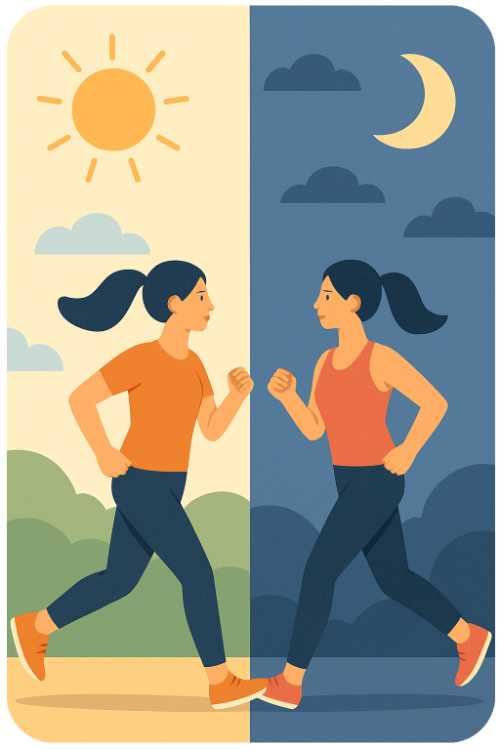Morning vs. Evening Exercise:
Does Timing Matter?
You’ve likely heard many opinions about the "best" time to exercise. Some friends swear by early morning routines, while others enjoy an evening stroll or workout after dinner. But does it really matter when you exercise? Let's explore what traditional Chinese wisdom and modern research tell us about timing your activities.
 In China, parks come alive at sunrise. People of all ages gather to practice Taijiquan (太极拳 tàijíquán), perform Qigong (气功 qìgōng), dance to music, or simply stretch and socialize. Traditionally, early morning is considered a time of renewal and clarity. According to Traditional Chinese Medicine (TCM), morning activities help regulate your body's internal clock, align your qi (气 qì), and gently awaken your energy for the day ahead.
In China, parks come alive at sunrise. People of all ages gather to practice Taijiquan (太极拳 tàijíquán), perform Qigong (气功 qìgōng), dance to music, or simply stretch and socialize. Traditionally, early morning is considered a time of renewal and clarity. According to Traditional Chinese Medicine (TCM), morning activities help regulate your body's internal clock, align your qi (气 qì), and gently awaken your energy for the day ahead.
Scientific research supports the morning enthusiasts, showing that exercising early can boost metabolism, improve mood, and enhance cognitive functions throughout the day. Middle-aged adults, often balancing busy careers and family responsibilities, frequently find that morning exercise helps reduce stress and keeps them energized and focused.
But what about evening exercise? Late-afternoon or early-evening workouts also offer distinct benefits. Studies have found that strength, flexibility, and coordination tend to peak in the late afternoon. For adults seeking to build strength, improve flexibility, or enhance performance in sports, exercising later in the day can actually produce better results. Evening exercise also helps many people unwind after work, releasing stress and tension accumulated throughout the day.
An evening stroll or gentle stretching session can improve sleep quality, too—an important factor at any age, but particularly valuable as we grow older. Contrary to popular myth, moderate evening exercise does not negatively impact sleep; rather, it can help your body relax more effectively, enhancing restful sleep.
So, what’s best for you? The simple truth is that the most effective time to exercise is whenever you feel most comfortable, consistent, and energized. Personal schedules, family responsibilities, and individual preferences matter greatly. The key is consistency and enjoyment. TCM reminds us that the ultimate goal of exercise is harmony within our bodies and minds, not rigid routines.
Why not experiment? If mornings are tough, try an evening walk or a brief session of Qigong before bed. If evenings are busy, consider setting aside even a short period each morning for gentle movement and stretching. Your body and mind will quickly tell you which rhythm feels most beneficial.
Remember, regular exercise, whenever you choose to do it, brings lasting health benefits. Whether you're a busy 40-something juggling daily demands or a senior enjoying a slower pace, listening to your body and choosing what feels good will always lead you to the perfect exercise routine.
Vocabulary Guide:
- Tàijíquán (太极拳): Tai Chi, a gentle martial art that improves balance and reduces stress.
- Qìgōng (气功): A Chinese practice involving gentle physical movements combined with breathing and meditation to enhance health and energy.
- Qì (气): Energy or vital life force in Traditional Chinese Medicine.






